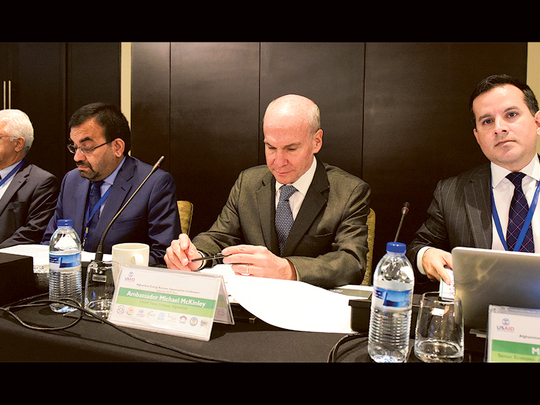
Dubai: Afghanistan is in talks with a few UAE companies for gas, solar and hydro projects, as the once war-torn nation seeks $5-6 billion (Dh18-22 billion) in infrastructure projects, the country’s power and water minister said on Sunday.
The government is moving fast to close the gaps in infrastructure amid stable macroeconomic indicators, with a reserve of $7 billion in its central bank, and reduce dependence on expensive imports.
“Out of the total requirement of $9 billion [for infrastructure projects], we have a commitment of about $2 billion from the donor partners like United States Agency for International Development (USAID) and others. The fund gap is about $5-6 billion in all infrastructure projects,” Ali Ahmad Osmani, Afghanistan’s minister of energy and water, told reporters through a translator on the sidelines of the Afghanistan Energy Business Opportunities Conference.
The country is also in discussions with a few UAE companies for some of its gas, solar and hydro projects, he added.
The power generated from Afghanistan could be even exported to neighbouring countries like India and Pakistan, home to a 1 billion-plus population.
“Our demand for power is not only for us but also for our neighbouring countries as well. If we invest in our infrastructure and power-generation programmes, we will fulfil not just our needs but also export extra power to neighbouring countries. We can transfer the power to those countries at a much cheaper cost as well,” Osmani said.
Tremendous gap
“There is a tremendous gap in demand and supply for power inside Afghanistan. Even with great improvements that have been made, more than 70 per cent of Afghans has no regular access to electricity. The conference is meant to begin closing that gap,” said P Michael McKinley, US ambassador to Afghanistan. The country is harping on renewable source of energy like solar, hydro, wind energy among others to ensure steadier supplies for industry and consumers. Afghanistan has one of the lowest per capita electricity-generation in the world.
Officials at the conference also tried to allay security concerns.
“If we look at 15 years of history, there has not been a direct attack on power plants or energy infrastructure. We can provide them with full assistance on security,” Osmani said.
McKinley also concurred. “Security concerns are real, and they cannot be minimised. Since 15 years, there have been very significant investments and engagements by foreign companies through construction of road and national grid, and the best way to approach this is to engage in joint ventures with local partners and navigate this situation,” he said.












